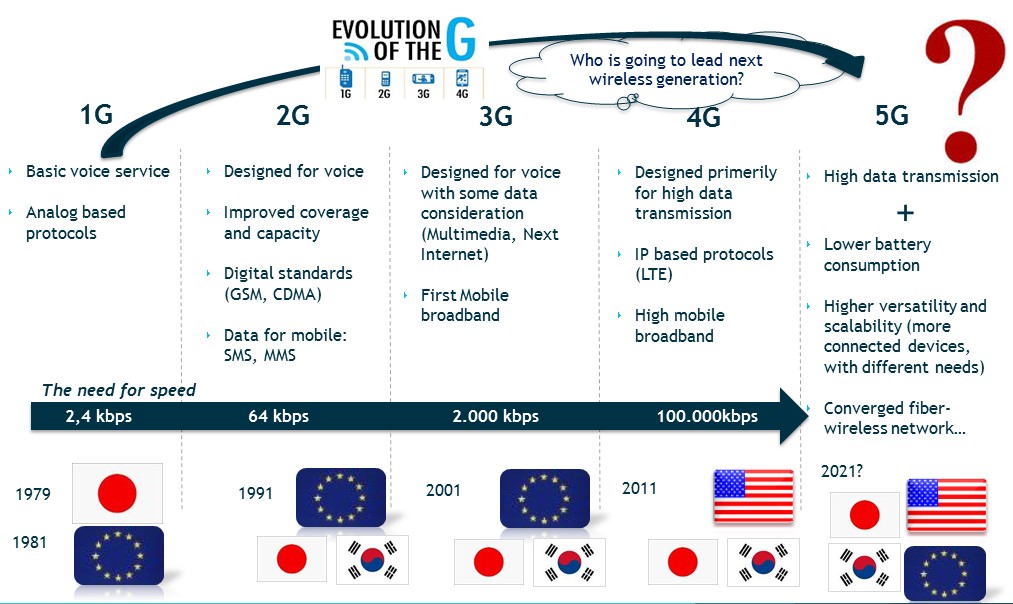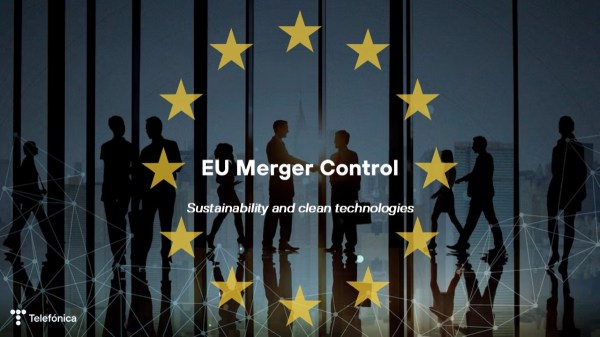
Telefónica and its CEO Jose María Álvarez-Pallete are endorsing the “5G Manifesto for Timely Deployment of 5G in Europe”, which was presented today July 7th at a meeting between Commissioner Günther Oettinger and CEOs from across the telecommunications and applications industries, including David Del Val, CEO of Telefónica R&D.
Telefónica supports European Commission’s efforts to accelerate 5G development in Europe. Backed by Telecommunications and Vertical Industry Players, 5G Manifesto Lays Groundwork for Launch of Commercial 5G Services in Europe by 2020.
The Digital Single Market (DSM) calls for actions to “boost competitiveness through interoperability and standardisation” and to support the digitalisation of Europe’s industry and services sectors. 5G has the potential to deliver substantial performance and capacity improvements for personal communications, public and enterprise communication. 5G can be a key enabler of the digitalisation of the European Economy.
5G launches will require substantial investments in new infrastructure, a large amount of spectrum and new capabilities, as well as a close collaboration between different agents.
This 5G Manifesto intends to foster effective interactions and collaboration with industry verticals, the formation of ecosystems as a result of large-scale demonstrators and, last but not least, an investment-centric policy framework – bringing together the key levers to ensure European digital leadership in 5G and beyond.
In order to facilitate the adoption of 5G technologies, the European Commission and Member States must support standards definition activities, encourage and incentivise cross-sector innovation through adequate policies and support for cross-sector hubs for experiments, trials and large scale pilot programs.
Telefónica is being very active in the R & D programme 5GPPP promoted by the European Commission. Promoting Large Scale Pilots with verticals is key to reveal new possible 5G features attractive to different sectors.
Incentivising investments at the centre of 5G Policy Framework, greater harmonisation and simplification of rules, the removal of deployment barriers and shaping a level playing field ICT regulation will be key.
5G is expected to require significant investments over time. Such investments will take place if the right regulatory environment is created in particular in the context of the forthcoming review of the European Electronic Communications Framework.
The EU regulatory framework should be reformed to have as a primary objective to secure long-term benefits to consumers and European economic development by incentivising investments in connectivity by all players and promoting innovation.
Improved regulatory certainty means:
- Sufficient spectrum – licensed in time, at reasonable prices and conditions is needed if the 5G target launch date is to be met, and to support the various applications and technologies that are envisaged in a “system of systems”.
- Fewer and simpler rules focused on cases where regulated access to key infrastructure (not replicable through competitive investment) still needs to be safeguarded, based on an assessment of market competition at the retail level;
- A permissive regime for Net Neutrality that allows network operators to innovate in new services and use all of the service differentiation functionality that 5G will allow;
- The right investment environment that encourages commercial flexibility through co-investment and risk-sharing models allowing for a fair long-term return on investments;
- A withdrawal of ex-ante regulation when appropriate is consistent with greater investment incentives for all players, in fibre among other 5G ready infrastructures.
- Where access regulation remains, long-term commercial agreements that enable competitive outcomes should be encouraged wherever possible as an alternative to regulation.
Achieving a dense deployment of 5G infrastructure requires greater harmonisation and simplification of rules and the removal of deployment barriers, including: right-of-way for the installation of passive facilities; supportive municipal site rental charges; removal of taxation on sites and antennas; and predictable, harmonised electromagnetic field (EMF) emissions limits.
Policies and rules must be future-oriented, pro-investment and pro-innovation. All players in the digital value chain should operate on a level playing field, with equivalent and proportionate privacy requirements to innovate in data-driven markets.
The EU and Member States must reconcile the need for Open Internet with pragmatic rules that foster innovation. The telecom Industry warns that the current Net Neutrality guidelines, as put forward by BEREC, create significant uncertainties around 5G return on investment. Operators should also be free to mix and manage different technology generations, mobile or otherwise, that are enabling 5G mobile technology to serve their customers optimally.
Member States and public organisations play a fundamental role in realising 5G: The success of 5G will also depend on EU-wide scale support, with Member States acting coherently – whether in regard to licensing, providing appropriate state support (such as public investment into a digital spine), or directing early public sector participation.







